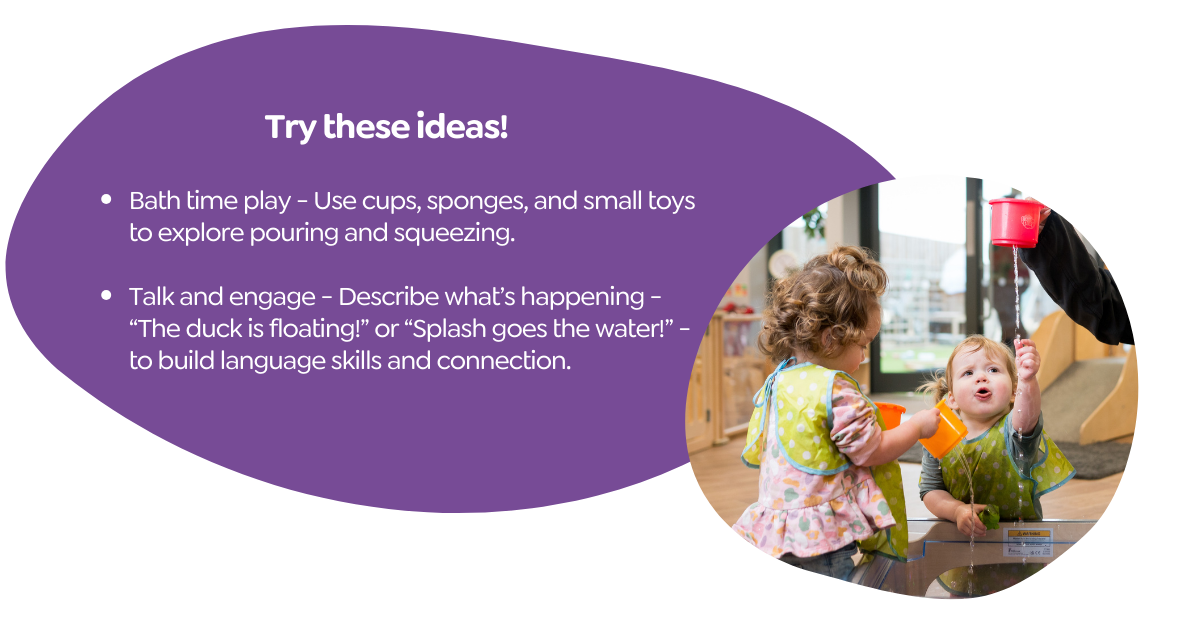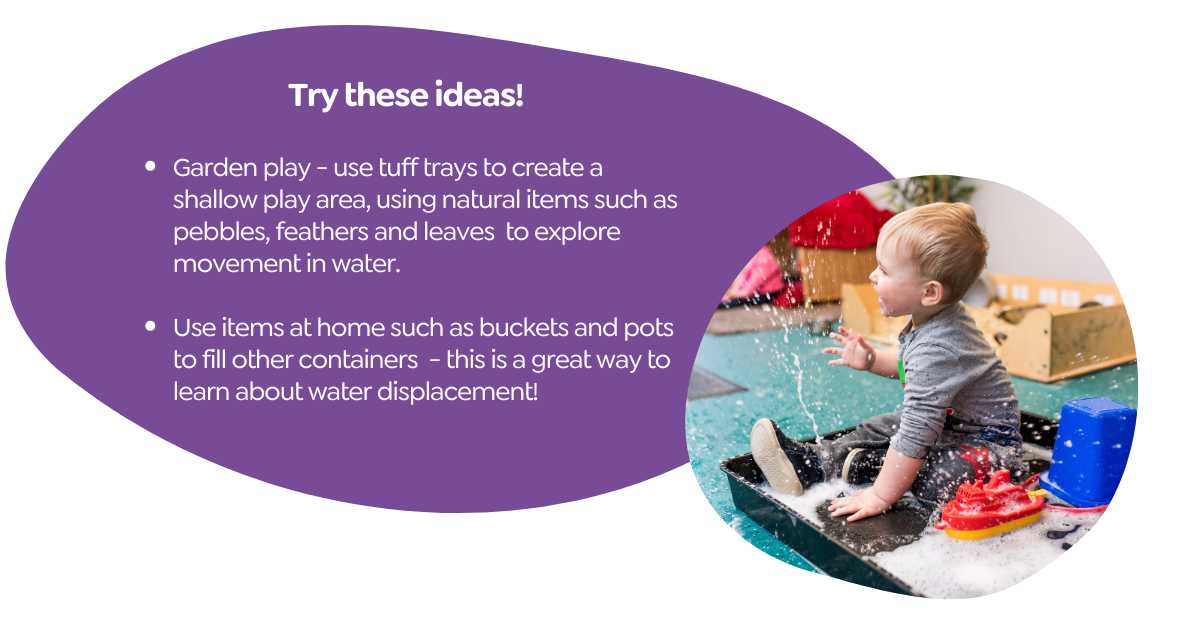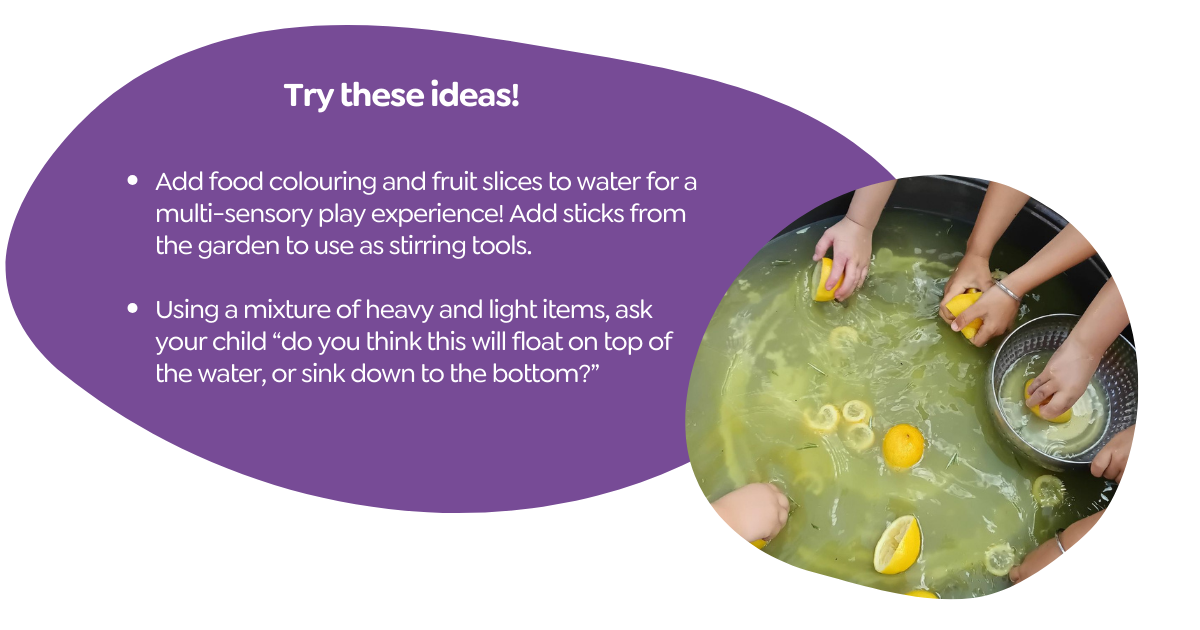Water Play

Some of the best learning happens through play - and water play is one of the key ways in which little ones begin to explore their world. Through sensory-rich experiences, children develop essential physical, cognitive, and social skills that form the building blocks for lifelong learning.
What we do
Our practitioners carefully design safe, age-appropriate environments where children can explore water through activities like pouring, splashing, and scooping. Using shallow trays of warm water, floating toys, sponges, and cups, we encourage sensory exploration and hands-on learning!
Children are encouraged to explore and experiment, helping them to understand early scientific concepts like volume, capacity, and buoyancy in a hands-on and playful way. We often observe children discovering cause and effect - such as what happens when they pour water from one container to another or add objects to see if they float or sink.
It also provides rich opportunities for social interaction, as children share tools, take turns, and work together, building important social skills like cooperation and communication. It’s a fun, calming activity that supports both cognitive and social development.

Water Play for Babies
Why it matters
Water play naturally encourages babies to use their muscles in new ways. When they pour water from a cup, grasp a sponge, or splash with their hands, they’re strengthening both fine motor skills (small movements like gripping and squeezing) and gross motor skills (larger movements like arm waving and reaching). These playful actions support muscle development and coordination - key for milestones like crawling, feeding themselves, and eventually writing.
Hand-Eye Coordination
As babies scoop, pour, and splash, they’re developing hand-eye coordination by linking what they see with how they move. These actions help them gain better control and precision - whether guiding a cup to pour water or reaching for a floating toy. Over time, these skills support more complex tasks like stacking blocks or catching a ball.
Sensory Exploration
Water play offers a rich sensory experience, exposing babies to different temperatures, textures, and movements. This stimulation helps build brain connections, supports language development by linking words to sensations, and sparks curiosity as babies experiment with how water moves and reacts.
Social and Emotional Development
Playing with water often brings babies together, encouraging social interaction and observation of others. The soothing rhythm of pouring and splashing also promotes emotional regulation, helping babies feel calm, focused, and secure during play.
What you can do at home
Water play doesn’t have to stay in the nursery! You can support your child’s development with some simple, fun activities at home.

Water Play for 2-3s
Why it matters
Water play is especially valuable for toddlers. At this age, children are building the foundations for key skills, and water play helps strengthen fine motor abilities and hand-eye coordination -essential for tasks like writing, feeding themselves, and dressing.
As toddlers explore and experiment with water, they nurture their natural curiosity and begin to develop early problem-solving skills. Socially, water play encourages cooperation, sharing, and communication, helping young children learn how to interact positively with others. Whether they’re pouring, splashing, or stirring, toddlers are learning through play in ways that support both their physical and social-emotional growth.
What you can do at home

Water Play for Pre-school
Why it matters
Water play also key in supporting the development of pre-school-aged children.
At this stage, children are naturally curious and eager to explore the world around them. Water play offers a hands-on way to investigate early scientific ideas like volume, capacity, and buoyancy - all while having fun!
As they pour, scoop, and experiment, they begin to understand cause and effect and develop problem-solving skills. It’s also a powerful tool for social learning. Children share space and resources, take turns, and collaborate, building essential communication and cooperation skills.
Water play is not only enjoyable and calming - it’s a meaningful part of how young children learn and grow.
What you can do at home
